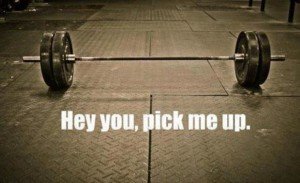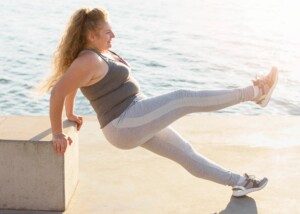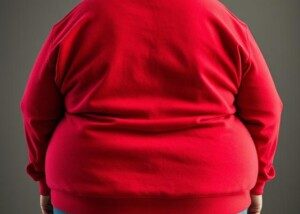Stop blaming your current aversion to exercise on past trauma related to diet culture.
Childhood trauma doesn’t get to dictate adult decisions to exercise.
I’m a former personal trainer who was inspired to cover this topic after reading a Substack article by fat liberationist Amanda Martinez Beck, titled “Reclaiming Movement.”
I began lifting weights at 15, but not to lose the little extra weight I was carrying, but instead, to get STRONG.
Amanda Martinez Beck, who calls herself a fat activist, has used diet culture as an excuse to avoid exercise during the 22 years she’s been an adult.
She’s not the only one who’s allowed herself to become stunted in this way.
Below is a screenshot of a comment to “Reclaiming Movement.”
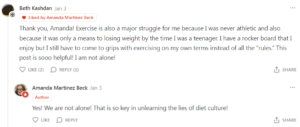
The “Reclaiming Movement” article basically speaks of how Amanda’s parents made her do softball, gymnastics and cheerleading “with the express intent of making my body smaller.”
Ultimately, she came to associate exercise as “punishment” for being fat.
Today, the Instagram influencer visibly appears to be 300 pounds.
Only now, at 40, is she beginning to extricate herself from associating exercise with psychological trauma – despite the mountains of scientific proof that working out yields a ton of benefits unrelated to weight loss – which, oddly, Amanda has repeatedly posted that she does not want.
Stop Making Excuses; Pick up a Barbell

Freepik.com
Though aerobic exercise can be empowering, I’m going to focus on lifting weights, because there’s just something magical and galvanizing about being able to lift heavy things – especially when you’re a woman.
When I was a personal trainer I’d tell my obese clients to focus on how much they could lift (as well as improvements in aerobic capacity). They got stronger, not bulkier. Their strength progressed as their bodies got smaller.
There’s nothing wrong with intentional weight loss when one is overweight and especially obese, even though Amanda Martinez Beck wants women to believe that “diet culture” is a reason to intentionally remain fat.
Diet Culture: You Make It what You Decide
Nobody but you yourself is at the helm when it comes to permitting diet culture’s narrative to live inside your mind — as Amanda Martinez Beck does to this day, even though she claims to be “healed.” See the screenshot below.

According to research, the diet industry has left deep scars on some women.
This phenomenon is often attributed to its alleged reinforcement of unrealistic ideals about body size, shape and worth.
I say “alleged” because I grew up in the same world as everyone else, yet have never felt pressure or reinforcement from the media, bosses at the workplace or school teachers to get down to a size 6. And I’m no fluke.
My resistance to, for instance, believing that I’d have more friends if I could make my thighs stick thin, is shared by many women.
Nevertheless, diet culture is blamed by many other women for “making” them try to conform to narrow body-beauty standards, often causing long-lasting mental trauma.
The shame associated with food, the pressure by parents to lose weight and the obsession with aesthetics (e.g., daily despondence over not being able to get one’s body to look like a Victoria’s Secret Angel) contribute to mental health struggles, severely restricted food intake and body dissatisfaction.
But what if there’s a way to combat this trauma?
One promising approach lies in weightlifting, particularly the act of picking up a barbell.
There’s something enchantingly validating about, specifically, a barbell because it’s much bigger than a dumbbell or the handle of a weight stack machine.
It’s also the implement we see super strong men hoisting over their heads during the Olympics.
The Trauma of Diet Culture
You don’t have to be like Amanda Martinez Beck, who thinks it’s inspirational to give up and settle for a slow moving, chronically pained 300 pound body.
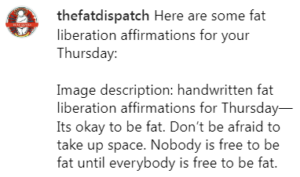
And you don’t have to wait until you’re 40 to start exercising.
Amanda’s exercise of choice, according to her article, is gentle bouncing on a mini-trampoline.
Yes, the bouncing should, indeed, be gentle, as years of morbid obesity have surely damaged her knee joints.
She says she wants to strengthen her core and stability while also wanting to remain morbidly obese.
But if Amanda Martinez Beck, along with women who think similarly to her, want the fastest way to strengthen their minds and stop living the life of victim to the weight loss industry, they’ll want to consider getting into lifting weights.
According to a study by Grabe, Ward and Hyde (2008), the portrayal of thin ideals in media can lead to body dissatisfaction, which is linked to a range of psychological issues such as depression, anxiety and eating disorders.
This dissatisfaction can spiral into disordered eating behaviors and a cycle of dieting, which ultimately leads to even more negative feelings about one’s body.
However, one doesn’t get to 300 pounds without an eating disorder, either.
Furthermore, portion control while continuing to eat one’s favorite foods is not likely to lead to disordered eating.
The problem is when people attempt some non-sustainable, gimmicky approach for weight loss.
It’s been claimed by many in the body positivity community that diet culture teaches women that they’re “unworthy” unless they’re smaller than a size 12.
Do YOU feel unworthy due to diet culture? If so, why?
- Why would you allow the prevalence of size 6 and size 4 actresses on your favorite soaps and prime time shows to make you feel unworthy?
- Ask yourself if feeling “not good enough” might be much more connected to how your parents made you feel – about yourself in general – when growing up? Maybe your parents should be blamed more than the person who chooses who gets to be a Victoria’s Secret Angel?
- Ask yourself if you might still feel unworthy if you could deadlift a 225 pound barbell or push an 85 pound barbell over your head!
The Healing Power of Lifting Weights
Pick up a barbell and you begin to engage in an act of body empowerment that emphasizes strength, resilience and self-improvement over appearance.

Freepik.com/standret
Of course, beginners will need to use light barbells. Gyms nowadays have barbells as light as 20 pounds.
You can also start with an unweighted Olympic bar. These weigh 45 pounds.
The type of exercise determines the weight. For instance, people will be able to deadlift much more than they can bench press.
The act of lifting weights focuses on what the body can do, rather than how it looks, and this shift in focus is vital for mental health.
Adopting a weight workout regimen doesn’t mean you need to abandon intentional weight loss attempts, especially if you’re morbidly obese.
But becoming physically stronger will make you mentally stronger. It can lead to healthier eating habits and replacing mindless overeating with mindful sensible eating.
Feeling your body get stronger will make you less aversive to the idea of exercise, including aerobic exercise.
Bartholomew et al. (2011) found that strength training can improve mood, decrease anxiety and depression, and enhance overall well-being.
Training with weights provides a concrete way to see progress.
Furthermore, weight workouts can be a key element in overcoming disordered eating such as bingeing or eating only at nighttime.
Harte et al. (2013) showed that consistent exercise, particularly resistance training, could help people reduce the risk of developing eating disorders.
It offers a different relationship with food and body image, as lifting requires fuel and nourishment to perform and recover well.
Mitchison et al. (2013) found that a focus on strength, rather than weight or appearance, can help individuals develop a healthier relationship with their bodies and reduce body dissatisfaction.
If you felt that this article slugged hard below the belt, consider that a good thing.
Because sometimes, a hit below the belt – rather than coddling – is what it takes to get people hopping in the right direction.

